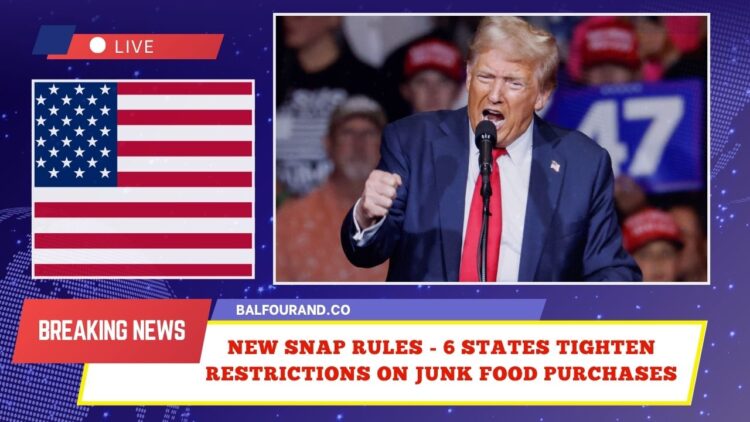In a significant policy change under the “Make America Healthy Again” initiative, the U.S. Department of Agriculture (USDA) has approved six more states to restrict the use of Supplemental Nutrition Assistance Program (SNAP) benefits on processed junk foods and sugary drinks.
Starting in 2026, Texas, Oklahoma, Louisiana, Colorado, Florida, and West Virginia will join other states in prohibiting SNAP recipients from buying products like soft drinks, candy, energy drinks, and certain desserts.
The move, supported by Agriculture Secretary Brooke Rollins and Health and Human Services Secretary Robert F. Kennedy Jr., aims to shift SNAP’s focus from just providing food access to promoting healthier diets and reducing the risk of diabetes, obesity, and other chronic illnesses.
Why Are These Changes Happening?
SNAP, previously known as the food stamp program, was created to help low-income individuals and families purchase essential groceries. However, recent data shows that a significant portion of SNAP funds is spent on soda, candy, and other unhealthy items.
Supporters of the reform argue that taxpayer dollars should be used to promote nutritious food choices, while critics believe these restrictions may unfairly limit personal freedom and cause confusion at the checkout counter.
States Implementing New SNAP Junk Food Restrictions
The table below shows all 12 states that have received waivers to restrict certain SNAP purchases, their effective dates, and the specific banned items.
| State | Effective Date | Restricted SNAP Purchases |
|---|---|---|
| Texas | April 1, 2026 | Sweetened drinks and candy with over 5g added sugar |
| Oklahoma | 2026 | Soft drinks and candy |
| Louisiana | 2026 | Soft drinks, energy drinks, candy |
| Colorado | 2026 | Soft drinks |
| Florida | January 1, 2026 | Soda, energy drinks, candy, prepared desserts |
| West Virginia | 2026 | Soda |
| Arkansas | 2026 | Sodas, drinks with <50% juice, candy |
| Idaho | January 1, 2026 | Soda and candy |
| Indiana | 2026 | Soft drinks and candy |
| Iowa | 2026 | All taxable foods except plants & seeds |
| Nebraska | January 1, 2026 | Soda and energy drinks |
| Utah | January 1, 2026 | Soft drinks |
What Foods Will Be Restricted?
While restrictions vary by state, most bans include:
- Soft drinks & sodas
- Candy (including chocolate and non-chocolate varieties)
- Energy drinks
- Prepared desserts (cakes, pies, etc.) in some states
- Fruit drinks with less than 50% real juice in certain states
In Iowa, restrictions are much stricter—prohibiting nearly all taxable food items except plants and seeds.
Potential Impact on SNAP Recipients
The USDA reports that SNAP serves over 42 million Americans monthly, representing more than 12.5% of the U.S. population. With these changes, millions of households will need to adjust shopping habits to comply with the new rules.
Supporters hope this will lead to healthier diets, while opponents worry it might limit flexibility and cause confusion at stores.
The 2026 SNAP restrictions mark a major step in aligning food assistance with public health goals. By limiting the purchase of unhealthy, processed foods, policymakers aim to encourage healthier eating habits among millions of Americans.
However, the true effectiveness of these reforms will depend on public acceptance, clear communication, and access to affordable healthy options.
FAQs
When will these restrictions take effect?
Most states will implement the bans in 2026, with some starting in January and others in April.b
Will SNAP still cover fruits, vegetables, and meats?
Yes. SNAP will continue to cover fresh produce, dairy, meats, grains, and other healthy staple foods.
Could more states adopt similar restrictions in the future?
Yes. The USDA has indicated that more states may receive waivers if they apply and meet the program’s health-focused criteria.




